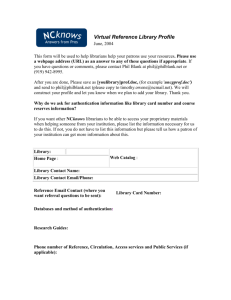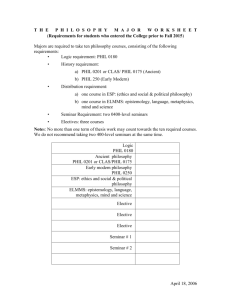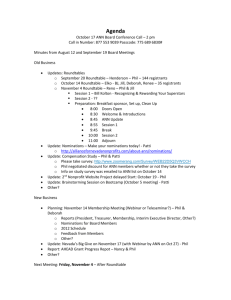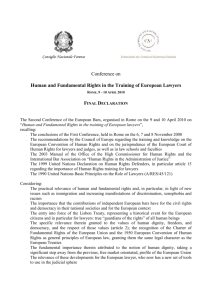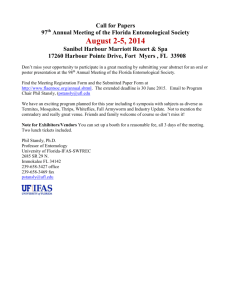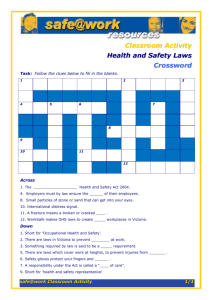Speech at launch - Human Rights Law Centre
advertisement
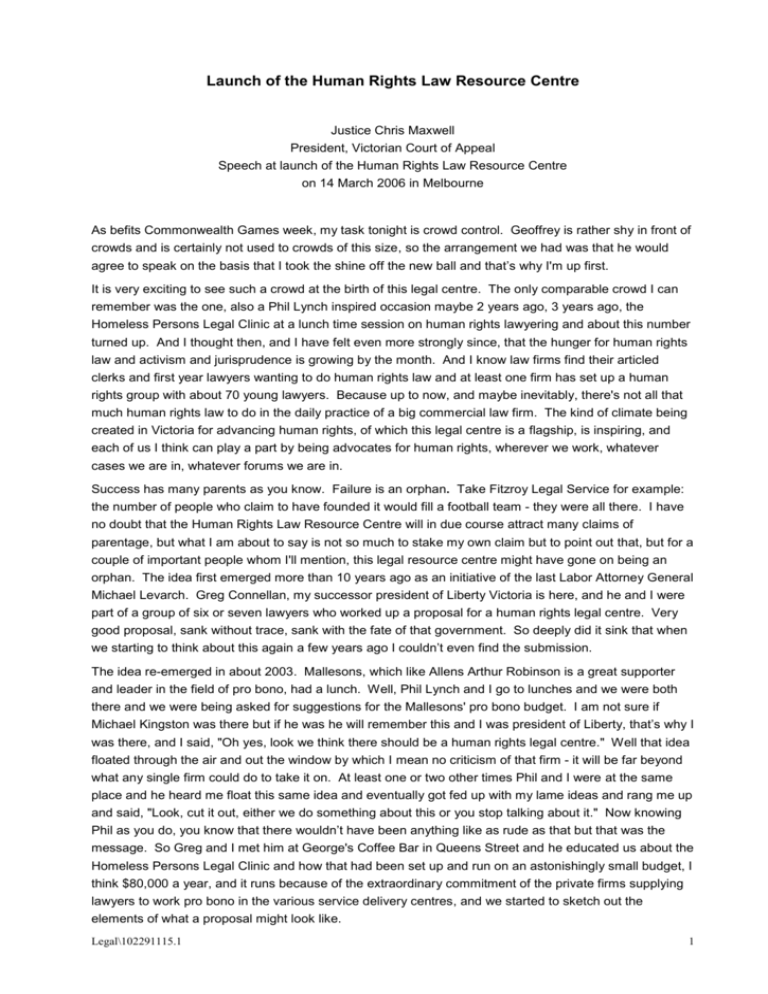
Launch of the Human Rights Law Resource Centre Justice Chris Maxwell President, Victorian Court of Appeal Speech at launch of the Human Rights Law Resource Centre on 14 March 2006 in Melbourne As befits Commonwealth Games week, my task tonight is crowd control. Geoffrey is rather shy in front of crowds and is certainly not used to crowds of this size, so the arrangement we had was that he would agree to speak on the basis that I took the shine off the new ball and that’s why I'm up first. It is very exciting to see such a crowd at the birth of this legal centre. The only comparable crowd I can remember was the one, also a Phil Lynch inspired occasion maybe 2 years ago, 3 years ago, the Homeless Persons Legal Clinic at a lunch time session on human rights lawyering and about this number turned up. And I thought then, and I have felt even more strongly since, that the hunger for human rights law and activism and jurisprudence is growing by the month. And I know law firms find their articled clerks and first year lawyers wanting to do human rights law and at least one firm has set up a human rights group with about 70 young lawyers. Because up to now, and maybe inevitably, there's not all that much human rights law to do in the daily practice of a big commercial law firm. The kind of climate being created in Victoria for advancing human rights, of which this legal centre is a flagship, is inspiring, and each of us I think can play a part by being advocates for human rights, wherever we work, whatever cases we are in, whatever forums we are in. Success has many parents as you know. Failure is an orphan. Take Fitzroy Legal Service for example: the number of people who claim to have founded it would fill a football team - they were all there. I have no doubt that the Human Rights Law Resource Centre will in due course attract many claims of parentage, but what I am about to say is not so much to stake my own claim but to point out that, but for a couple of important people whom I'll mention, this legal resource centre might have gone on being an orphan. The idea first emerged more than 10 years ago as an initiative of the last Labor Attorney General Michael Levarch. Greg Connellan, my successor president of Liberty Victoria is here, and he and I were part of a group of six or seven lawyers who worked up a proposal for a human rights legal centre. Very good proposal, sank without trace, sank with the fate of that government. So deeply did it sink that when we starting to think about this again a few years ago I couldn’t even find the submission. The idea re-emerged in about 2003. Mallesons, which like Allens Arthur Robinson is a great supporter and leader in the field of pro bono, had a lunch. Well, Phil Lynch and I go to lunches and we were both there and we were being asked for suggestions for the Mallesons' pro bono budget. I am not sure if Michael Kingston was there but if he was he will remember this and I was president of Liberty, that’s why I was there, and I said, "Oh yes, look we think there should be a human rights legal centre." Well that idea floated through the air and out the window by which I mean no criticism of that firm - it will be far beyond what any single firm could do to take it on. At least one or two other times Phil and I were at the same place and he heard me float this same idea and eventually got fed up with my lame ideas and rang me up and said, "Look, cut it out, either we do something about this or you stop talking about it." Now knowing Phil as you do, you know that there wouldn’t have been anything like as rude as that but that was the message. So Greg and I met him at George's Coffee Bar in Queens Street and he educated us about the Homeless Persons Legal Clinic and how that had been set up and run on an astonishingly small budget, I think $80,000 a year, and it runs because of the extraordinary commitment of the private firms supplying lawyers to work pro bono in the various service delivery centres, and we started to sketch out the elements of what a proposal might look like. Legal\102291115.1 1 We got out respective organisations, PILCH and Liberty Victoria, to back it in principle. We established a reference crew and I want to pay tribute to the 20 or so lawyers and academics and, community legal centre representatives, who came to half a dozen meetings at the end of busy days and what I found so rewarding about that process was how importantly the concept was refined. Again not having done the hard thinking, it hadn’t struck me that it wouldn’t work as a shop front legal centre. You wouldn’t have human right cases walk in off the street, often because they don’t self-identify. What you want is people in community legal centres and citizens advice bureaus to know how to recognise one and then you can get help from people who know the stuff. So from this concept was borne the idea of the human rights legal centre being a second tier resource, not a front line resource but a clearing-house for expertise, of which there is a huge amount in the profession and particularly in universities. Lots of lawyers working, writing, thinking about this stuff and very keen to be used. The other thing we learnt in the reference group process was that it would require, if it was going to work, a very active educational function from the centre. So it wouldn't just be service delivery, it would be out there explaining what a human rights case might look like, what feature of an ordinary common or garden civil or criminal matter might raise an issue to which international human rights jurisprudence might be relevant and that was a revelation to me and that is was the centre is going to do. I should just mention in passing, one of the members of that group was a recent arrival from Sydney, an experienced community lawyer. He commented at the end of one our meetings, its remarkable to have 20 people sitting around a table discussing a human rights community legal centre, and I stopped and thought I didn’t think it really was remarkable, but it says something about the sort of culture that I mentioned before to which organisations like PILCH have contributed. Then it was time for the State Justice Statement and we thought, well second time lucky and we put in a terrific bid, and lots of encouraging noises out of Justice and we got nothing, and I think it haven’t been for the resilience and optimism of Phil Lynch that might have been that, though I think between him and a few others we would have kept the flame alive. And that’s where David Krasonstein came in and the NAB just deserves the biggest plaudits for making this happen. The private sector has shown what needed to be done when government couldn’t manage it and it was a shame that there was no public money for this centre in last year's budget, a great shame! There should have been, and there wasn’t a dollar and instead the NAB made available the crucial funds which meant that we could set it up and talk to other funding organisations about small or additional contributions and lo and behold we have a centre. I can hardly believe it. I hope you feel as excited as I do. So I pay a personal tribute to David for that vision, that sense of an opportunity to be grasped and when the time comes time to count the parents, he ought to be equal first in the list with Phil Lynch. As you heard from Phil we now have a number of others contributing in money and kind and I won't repeat them except to say how grateful all of us here as supporters of human rights are. But I want to pay a special tribute to Phil Lynch. You will know him through his work at PILCH - he has made the Homeless Persons Legal Clinic into one of the outstanding pro bono service delivery models in the nation and now to have him, as I hoped secretly we would have him, as the foundation Director of this legal centre is just too good to be true. So I think we should have a big hand for Phil. I also want to thank Greg Connellan, whom I mentioned before, who has worked closely with me on the Liberty side in talking about and developing and finally implementing this concept. Greg has been campaigning for human rights in Victoria a lot longer and a lot harder than I have, including campaigning as President of Liberty Victoria for the Charter of Rights which we like to think we are on the verge of having in Victoria, so thanks Greg. The advent of the centre couldn't have come at a better time. We are on the verge of having a human rights charter. The Attorney announced last November that the government would legislate the Williams Report. As I said at a gathering in Sydney, we have been very fortunate to have that particular NSW Legal\102291115.1 2 import. George's review was of outstanding quality and the Report is just as good. If you haven’t had a chance to read it I commend it to you. It's very accessible and explains his recommendations but also gives a very good flavour of the consultation that went on. But the other reason that this is an exciting development is that there is new leadership in the Supreme Court. The Chief Justice and I are both committed to introducing and developing human rights jurisprudence in the Supreme Court in both in the Trial Division and in the Court of Appeal. But as I have said previously when talking on this topic, the judges need plenty of good help on this as on anything else. We are not very good at knowing when a human rights point arises and we are even less good at knowing where to find the law when it does, and that’s why a centre of excellence like this one will accelerate and facilitate the kind of process of human rights in the Courts which I am keen to promote. It occurred to me recently that we are very well, we are all trained to search for precedents in the annals of the common law, but we don’t know where to start in the annals of human rights jurisprudence. And yet there already are, even in a nation with such immature human rights jurisprudence as Australia, quite sufficient examples of that body of law being used that we shouldn’t go on being as ignorant as we are. And that’s where you as lawyers and this centre as a resource for lawyers, have much to contribute. I have tried to encourage in appeals so far reference to human rights law where it is relevant. It often won't be but it sometimes will be, and in the public interest immunity case that I have mentioned before publicly involving the abortion records we asked for submissions about international and human rights law on privacy as against the demands of proper regulation of the medical profession. We got outstandingly good submissions. In a bail case I did before Christmas, I had occasion to refer to the international learning on minimum rights for prisoners. It doesn’t necessarily answer the question - it may often be no more than a point of reference but where we are dealing with issues of universal significance, whatever the peculiarities of Victorian law, we can gain from the learning internationally on those issues. You will remember of course that there is much to be done with international treaties even where they are not incorporated into domestic law. They're relevant to interpretation, they're relevant to the development of the common law, they're relevant as an indication of the value which this nation places on the values set out in those international instruments. All of that as you recall comes from the joint judgment in Teoh's case to which I never tire of referring, and which I previously recommended you should have in one of those Perspex stands on your desk just to remind you of the potential for making ourselves literate in human rights law. Successive governments of both colours have tried to destroy Teoh and failed - long may that continue. The last thing I want to say is that there are other important ways in which the courts must recognise human rights. The first is of course in the way we administer justice. What we do in enabling individuals to assert and defend their rights is to engage in human rights ourselves. The criminal justice system is at its heart about human rights. As it was mentioned by David, we are trying to remove obstacles to access to justice in the Supreme Court by appointing a number of selfrepresented litigants' coordinators - that should be announced in the next few weeks - and establishing a pro bono scheme copying unashamedly the terrific scheme in the Federal Court under Order 80. I am looking to talk to the legal aid authorities because of the importance of adequate legal aid for proper representation and for proper decision-making when it comes to us. In all those ways the advance in human rights culture and the establishment of a Centre like this give great reason for optimism but the progress will be faster if, as I said earlier, each of you keeps talking about it, advocating it, arguing for it, writing to the paper, ringing the talk-back and saying particularly, it need hardly be said in an era where security legislation goes through on the nod, the importance of vigilance by those who understand human rights and why it matters that we don’t destroy the society we value in the process of purportedly protecting it - that’s why we need to keep speaking out. Legal\102291115.1 3 It gives me great pleasure to launch the legal centre which I think Phil asked me to do. The metaphorical bottle of champagne is swinging in your direction right now and I wish her well and I'm sure we all wish the best for all those who sail in her. Thank you. Legal\102291115.1 4


